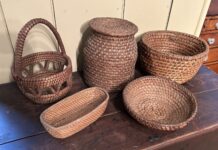One aspect of country life that interests me most is that it is never the same day after day. There are always new footprints on the snow, some familiar, like those of the skunks, who leave a special track near the big old trees where the tail drags, and some others that are impossible to identify. One year at the end of February, we hung buckets on spiles in those trunks and learned to appreciate maple syrup. After days and nights of lugging sap and boiling it down, we had four pints of pale gold syrup. From then on, we bought our syrup, and I still do, at the Stiles farm down the Woodbury Road. On our farm, shadows on the snow are never exactly the same as yesterday’s. And no two fires in the great fireplace are duplicates. Perhaps the only constant thing in life is change.
— Country Chronicle by Gladys Taber, 1974
By JUDITH SUTHERLAND
Farm and Dairy columnist
One reason I have always loved history — whether it is family history, American history, or wonderful local legends — is that it isn’t going to change. Looking ahead, or living just one day to the next, change is something we had better embrace. But it’s nice to read about our past and know it is already written in stone.
Author Ann Mohin once wrote of her mother’s love for spinning wool in the evening, a sort of relaxation after a day of much harder work, though at that time in history it was a necessity.
“The repetitive hum of the wheel was as comforting as a lullaby; that the rope of spun wool from sheep born and raised on our land would be knit into a warm piece of clothing produced a rare symmetry.”
Self-sufficient
It was a comfort and a challenge for every farm family in days gone by to attempt to be as self-sufficient as possible, with enough eggs and cream to sell for pocket money to purchase sugar, flour and a rare treat or two.
As farms grew and became more specialized, it was a farmer-turned-writer, Louis Bromfield, who urged farmers to remain diverse enough, at least on a small scale, to feed their own families. He urged neighbors to share their fruit and vegetable crops, each growing items best suited for their soil, and avoiding waste.
Pioneer
By the late 1940s, Bromfield was a Hollywood star, though he preferred the quiet of his idyllic farm here in Ohio. He was, in many ways, ahead of his time in urging soil conservation and cooperative farming, preaching working with nature while building independence from governmental intrusion.
Because of his way of thinking, many accused him of being a Communist.
We have lost many of our self-sufficient mentors, and I’ve wondered how many of us could survive if we had to again “build” our food and our clothes.
Our large maple trees are tapped this year, the sap flowing. Our Amish neighbor boys, Jake, Willie and Mosey, come by twice a day with their horse-drawn wagon with a collection barrel to empty the buckets.
Sharing
The sap was running so freely that they ended up bringing a new milk can for the overflow. Knowing we wouldn’t have the time to do anything with it, we offered it to our neighbors. We share with them, and they kindly share with us.
Hundreds gathered this past weekend at Malabar Farm, once Louis Bromfield’s home, now a state park, to witness the process of maple syrup making. If he were still here, he might bristle at the thought of such crowds on his reverently quiet farm, but it is one way to bridge the gap of understanding that so many farm products start in nature, and it is up to us to do the work of bringing them to the table to be enjoyed.
Process
Anyone who has ever complained about the cost of genuine maple syrup has never been a part of the long process that begins at the maple tree. It is all the more sweet when the end product is shared, appreciation for the work adding to the pleasure of it all.












